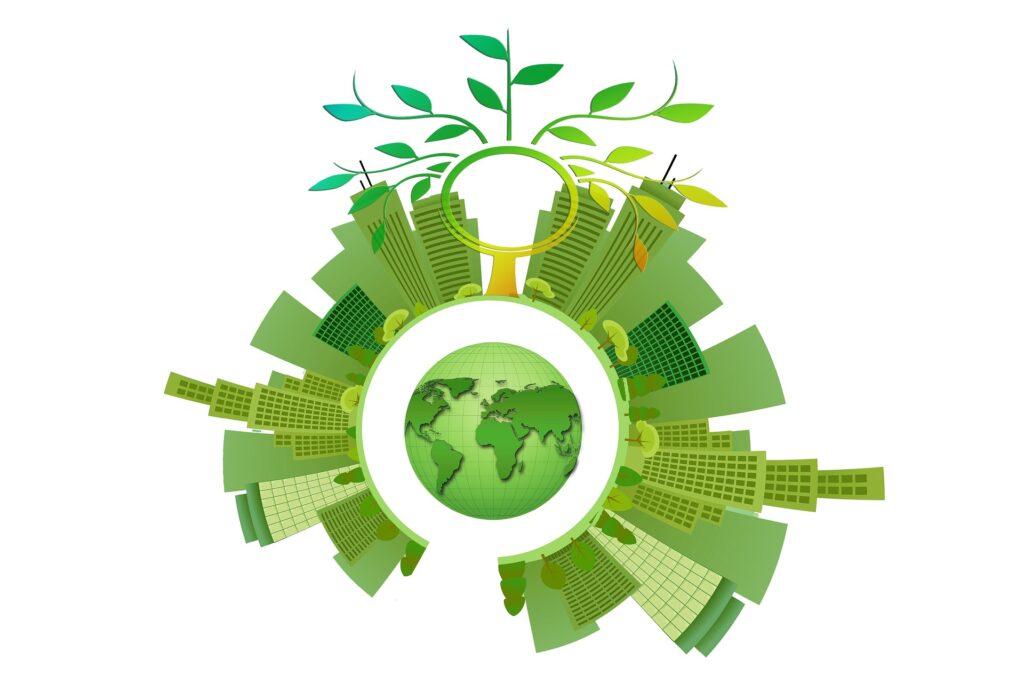Learning Objectives
- to introduce the topics sustainability and Earth Overshoot Day and offer suggestions on how to address these topics at school
Resources needed
- Internet access
Warning!
You can try out all activities and excercises, but you can't save any data. Please login or create a free account to save your data.
Sustainability and how to live sustainably are widely discussed nowadays. It seems to concern every aspect of our lives as we are reminded to live sustainably, travel sustainably, and shop sustainably. This activity will introduce you to the Sustainable Development Goals (SDGs) and the Earth Overshoot Day, and you will explore possibilities to address sustainability at your school.
Exercise 1: Sustainability and Sustainable Development Goals

The word ‘sustainability’ is used often and in various contexts, but what does it really mean? Please watch the following video about sustainability to gain a better understanding of the concept of “sustainability”.
Now that you have watched the video, please answer the following questions.
The video’s key statement is that “Sustainable development is development that meets the needs of the present without compromising the ability of future generations to meet their own needs”.
What are your thoughts on this?
Sustainability is also about how everything is connected. If you buy a new phone, someone has to produce it first and once you throw it away, someone else has to process the waste.
Please share your personal view of how you perceive the interconnectedness of the world.
Sustainability is a topic that is not only important for everyone but also affects several aspects of our lives. It is therefore not surprising that global initiatives have been started which aim to draw attention to the issue of sustainability. One of the best known initiatives is the UNESCO’s Sustainable Development Goals (SDGs).
Please have a look at the SDGs website and answer the following questions.
Does your school or your teaching actively address any of the SDGs? If yes, which?
Which SDGs are important to you and are already being addressed in your teaching?
Exercise 2: Earth Overshoot Day

There are several global efforts whose aim is to raise people’s awareness about sustainability. One of the most known ones is the Earth Overshoot Day and the concept of the Ecological Footprint. The Ecological Footprint Network defined the Ecological Footprint as follows:
The Earth Overshoot Day then calculates on which day we have used up all of the natural resources that the Earth can generate per year. Have a guess!
Quiz
On which day, do you think, do we use up all of the resources available for that year?
- May 20th
- July 29th
- October 13th
This means that after only seven months, we have used up all of the natural resources that the Earth can provide for this year! This calculation is of course a world-wide average. However, the Ecological Footprint Network offers a calculator with which you can calculate your own personal Earth Overshoot Day.
Your result:
- Correct answers:
- Wrong answers:
Please visit their website and learn more about your personal Overshoot day.
Please answer the following questions to further reflect on this topic.
Does your personal Earth Overshoot Day surprise you?
Knowing what the Ecological Footprint and Earth Overshoot Day are, were there any questions that you did not expect when determining your Ecological Footprint? If yes, which and why?
After seeing your personal Earth Overshoot Day and the factors contributing to it, are there any aspects of your life that you would like to make more sustainable?
Exercise 3: Sustainability at school
Sustainability is slowly finding its way into some country’s curricula. Australia and Italy, for example, have adapted their curricula to feature sustainability and the environment more prominently in their teaching (Earth Day, 2019; Australian Curriculum, n.d.). Teachers of many subjects and in many countries have made it their mission to find a way to weave sustainability into their teaching and familiarise their learners with the ethos of sustainability.
Please read the following article about ideas of how to address sustainability in schools.
The article mentions several suggestions of how to engage learners with sustainability, which are listed in the left column of the table below. Please rank them in the right column according to how feasible you think it is to introduce them at your school. Use the number 1 to 6, with 1 being the most feasible suggestion.
| Engaging learners with sustainability | My Ranking |
|---|---|
| Recycling | |
| Reduce food waste | |
| Literature to promote green practices | |
| Smart development | |
| Physical plant | |
| Emphasising re-use |
Please elaborate on your first choice.
What ideas do you have for teaching your learners about this aspect of sustainability? Which projects and initiatives could you imagine implementing at your school?
Here are some school initiatives and programmes to inspire you. The ideas are taken from the Green Schools Initiative and the Sustainable Schools New South Wales.
- create a vegetable garden or visit a National Park
- host a ‘Meat Free Monday’ or a ‘Waste Free Lunch’ or a ‘Bike to School Day’
- provide sustainable school supplies and host paper-free school events
